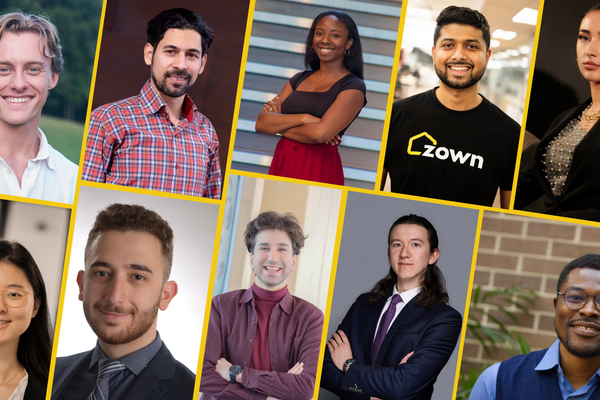
Addressing our global future with expert thought leaders
Global Futures 2024 launch event engages dialogue and action on the world’s complex challenges

Global Futures 2024 launch event engages dialogue and action on the world’s complex challenges
By Angelica Marie Sanchez University Relations“The world continues to face compounding major crises, and education and research are essential to ensuring society is equipped to tackle these challenges head-on,” said Vivek Goel, University of Waterloo’s president and vice-chancellor, in his opening address at the Global Futures 2024 launch event on January 31.
Waterloo researchers and entrepreneurs are committed to finding and addressing the world’s most pressing challenges with a multi-disciplinary approach. Goel added that in order to achieve this vision, we must start by thinking globally and acting locally.
This kick-off event welcomed more than 300 Waterloo staff, faculty and students, with an exclusive first look at the Global Futures 2024 publication and the Research Talks series. Featuring Waterloo researchers and entrepreneurs and their impact on our economic, societal, technological, sustainable and health futures, and their expertise on the implications that these five futures have for research, teaching and engagement.
“At the core of these five futures is a concern for the future of humanity,” Goel said. “The Global Futures, aligned to our academic and research strengths, will help us to focus and co-ordinate our work across disciplines and organizational boundaries.”
The theme of intersection between the five futures and the impact researchers and entrepreneurs have on our complex future was top of mind for the panel of speakers and the audience at the launch event.
Goel was joined on stage by Dr. Bessma Momani, associate vice-president of Waterloo International and professor of political science, and Dr. Marcel O’Gorman, University Research Chair and professor in the Department of English Language and Literature. Momani and O’Gorman provided a global outlook on the social and technological factors that are causing instability and inequalities across society, and how their research implements critical thinking within the intersection of the five futures.
Waterloo masters’ students, Rachel Almaw and Seun Adetunji, shared their work and vision for the future of health. They joined Goel and the panel of speakers for a Q and A session with the audience. Almaw and Adetunji shared how their personal experiences not only fuelled their drive to have equity, diversity and inclusion at the heart of their research, but also inspired their journey to find problems to solve within the health and technology sector.
Resilience, community and problem finding, were a few of the key takeaways that the keynote speakers wanted the audience to consider to make our ideal future possible. Universities plays a vital role in creating critical thinkers. The audience was asked how we can use an interdisciplinary lens to make us question and share knowledge, while we work towards solving the world’s most pressing issues.
“Our students are eager to work across these boundaries and not be locked into boxes. Together, we are working towards bringing our strengths across disciplines to solve these big global challenges,” Goel said.
“Co-op, entrepreneurship, innovation and connections to our local communities, are the things that made us strong in our early years and will remain the basis of how we’re looking forward.”
Read the 2024 Global Futures publication on our website to learn more about the inspiring stories showcasing people in our community and their boundary-breaking research.

Read more
Here are the people and events behind some of this year’s most compelling Waterloo stories

Read more
Here are the people and events behind some of this year’s most compelling Waterloo stories

Read more
From transforming solutions for homeownership to advancing health care interventions, Waterloo talent continues to disrupt industries and drive change
The University of Waterloo acknowledges that much of our work takes place on the traditional territory of the Neutral, Anishinaabeg, and Haudenosaunee peoples. Our main campus is situated on the Haldimand Tract, the land granted to the Six Nations that includes six miles on each side of the Grand River. Our active work toward reconciliation takes place across our campuses through research, learning, teaching, and community building, and is co-ordinated within the Office of Indigenous Relations.